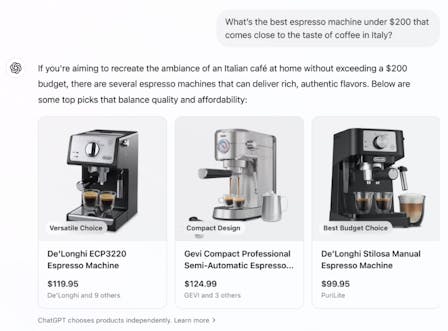ChatGPT Enters E-Commerce with the New Product Search Feature
OpenAI’s latest update to ChatGPT brings product search directly into its conversational AI, integrating product images, prices, reviews, and even direct purchase options, allowing consumers to seamlessly discover products without leaving the chat interface.
Unlike traditional marketplaces, where visibility is often determined by paid ads and sponsored placements, ChatGPT’s recommendations rely on structured product data. This opens up new opportunities for brands to be discovered outside of paid advertising, with potential affiliate partnerships on the horizon.
This Can Change Product Discovery
As AI-powered shopping assistants like ChatGPT gain traction, they are becoming a significant channel for product discovery. This shift could alter how consumers interact with e-commerce platforms, reducing the influence of traditional touchpoints like Google ads and Amazon listings.
For brands overly dependent on Amazon for visibility, this could signal the need to adapt. ChatGPT may soon compete with Amazon as a leading tool for product discovery.
Limitation & Risks
Despite its potential, however, ChatGPT still has notable limitations.
Our tests revealed that it can recommend products with incorrect Amazon links. Additionally, the way ChatGPT prioritizes information is inconsistent and lacks a regulated ranking system, which can lead to unreliable recommendations that confuse both consumers and brands.

Checklist
Audit and Optimize Your Bing SEO
Since ChatGPT relies on Bing’s indexing for its product results, optimizing for Bing – especially with conversational, question-based search – offers brands an early advantage. However, it’s important to stay cautious, as Bing’s data quality still lags behind Google, meaning brands should not ignore Google in favor of Bing.
Prioritize Structured Product Data and Reviews
To thrive in AI-driven searches, brands must enhance structured product data, highlighting key attributes, benefits, and clear product specifications. This will help outperform traditional SEO practices that focus only on keywords.
Plan for Hyper-Personalization
While OpenAI’s upcoming “memory” feature is not yet available in Europe, brands can start planning for personalized customer experiences through CRM systems and dynamic content. Delaying these efforts could leave your brand at a competitive disadvantage.

Amazon vs. ChatGPT: What’s Next?
ChatGPT may have introduced a new frontier for product discovery, but Amazon’s core strengths remain: fast delivery, consumer trust, and customer service. Innovation is key for both Amazon and brands looking to stay ahead.
Exploring potential partnerships with OpenAI could help Amazon adapt, but brands must also diversify their strategies to keep up with the changes.
It is time for businesses to focus on testing and refining AI-driven optimization, acting quickly to remain competitive as the market shifts more and more toward AI-driven solutions.
